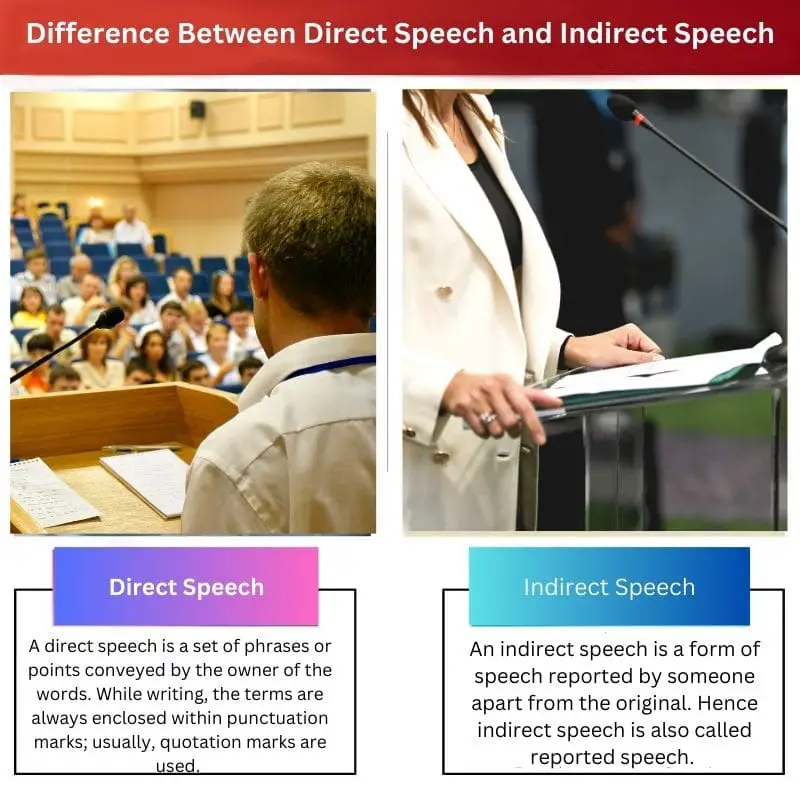In novels, most of them will be narrations else. We will come across dialogues said by the people. So while writing a book, the writer has to take care of the narrative and dialogue parts.
When we start writing, we use different types of speech. Either we convey what the speaker has said. Else we make it as a statement in our own words.
- Direct Speech
- Indirect Speech
Hence they play a significant role in literature or a journal. The writer has to know where to use the lines in dialogue form and where to use the narrative structure of the speech.
Key Takeaways
- Direct speech quotes a speaker’s exact words; indirect speech conveys the meaning without using the original words
- Direct speech uses quotation marks; indirect speech does not
- Direct speech retains the original tense; indirect speech may require tense changes to maintain accuracy.
Direct Speech vs Indirect Speech
Direct speech refers to the actual words someone said, written in quotes, retaining the original speaker’s exact language. Indirect speech, also known as reported speech, conveys the same information but rephrases the original statement, shifting tenses and pronouns.

Comparison Table
| Parameters | Direct Speech | Indirect Speech |
|---|---|---|
| Meaning | In a direct Speech, the plain meaning is conveyed. | In an indirect speech, an exaggerated meaning is conveyed. |
| Alternative names | Direct speech is also called Quoted Speech. | An indirect speech is also called Reported Speech. |
| Perspective | The words can be understood from s point of view. | The words of view can be understood from various other listeners’ points of view. |
| Usage of Punctuation marks | Direct Speech makes use of punctuation marks. | There will be no punctuation marks for an indirect speech except for a period at the end. |
| Emotions | A direct speech will have more impact on a person’s feelings. | An indirect speech can not create much similar to that of direct speech. |
What is Direct Speech?
A direct speech is a set of phrases or points conveyed by the owner of the words. While writing, the terms are always enclosed within punctuation marks; usually, quotation marks are used.
A teacher lecturing their wards is an example of direct speech. The person conveying the message will have direct control over the people’s emotions. People could sympathize with them when they hear it from someone who has gone through tough times.
Some examples of direct speech are:
- Mr.Andrew said, “I am going to the office.”
- Dr.Paul told Peter, “You should take your medicine regularly.”
- Han said to Jane, “o not switch on the light.”

What is Indirect Speech?
An indirect speech is a form of speech reported by someone apart from the original. Hence indirect speech is also called reported speech.
Apart from this, it cannot be used as such when mentioning the time in an indirect speech. For example, ‘yesterday’ will be conveyed in indirect speech as the day before. So an indirect speech should undergo various changes to convey the meaning of a direct speech.
Some examples of Indirect Speech are
- Mr.Andrew said that he was going to the office.
- Dr.Paul advised Peter that he should take his medicine regularly.
- Han told Jane not to switch on the light.

Main Differences Between Direct Speech and Indirect Speech
- The person who owns the words will deliver them in a direct speech. But an indirect speech is provided by an intermediate person to the rest of the people.
- In a direct speech, there may be fillers when the speaker wants to take some time, but an indirect speech can not have many usages of fillers.


The contrast between direct and indirect speech creates depth in the narrative and aids in character development. Mastering the use of both techniques has a profound impact on the storytelling process.
We can agree that the creation of dialogues and narratives really adds a new dimension to the book’s storyline. This is crucial for the reader to understand the context and setting of the story, and also to feel immersed in it.
I completely agree. It also makes it easier to distinguish between different characters and makes the book more entertaining.
The comparison between direct speech and indirect speech provides valuable insights into the art of storytelling. It’s an enlightening exploration that deepens the understanding of narrative forms.
Absolutely. The meticulous examination of these speech forms broadens our perspective on the storytelling process and its impact on readers.
Indeed, Robinson. The comprehensive comparison sheds light on the intricate techniques employed in crafting compelling dialogues and narratives.
The examples provided really clarify the difference between direct and indirect speech. Understanding these concepts can be pivotal for aspiring writers to deliver engaging stories.
Indeed, it’s insightful to see how these techniques are used in practical writing. This is certainly beneficial for those delving into the art of storytelling.
Direct speech can effectively evoke emotions and make the characters feel more real, while indirect speech is a valuable tool for conveying information. The balance between the two is crucial for an engaging narrative.
I couldn’t have said it better. It’s all about balancing the impact of speech to deliver a compelling narrative.
Direct speech, with its impact on emotions, and indirect speech, with its rephrased meaning, both complement each other and are indispensable in creating a rich and captivating narrative.
Well said, Helena. The interplay between direct and indirect speech is truly an art that elevates the literary work to new heights.
It’s fascinating to see how direct speech and indirect speech have distinct contributions to literature. Exploring these concepts enhances the appreciation and comprehension of storytelling techniques.
Absolutely, Jade. This understanding enriches the reading experience and cultivates a deep appreciation for the craft of storytelling.
The use of direct speech and indirect speech highly contributes to a novel’s appeal. It’s really interesting how it can impact the readers’ perception and engagement with the story.
It’s fascinating to see how this technique shapes the characters. It indeed plays a significant role in literature and storytelling.
While direct speech retains the original tense and language, the shift in tenses and pronouns in indirect speech is an interesting aspect in literature. It gives the writer more flexibility in storytelling.
Absolutely. The variations possible through indirect speech provide depth to the narrative structure and enhance the readers’ experience.
Understanding the nuances between direct speech and indirect speech is crucial for crafting compelling dialogues and narratives. It’s a fundamental aspect of literary work that shouldn’t be overlooked.
Absolutely, Donna. This skillful storytelling technique captivates readers and enriches the reading experience.